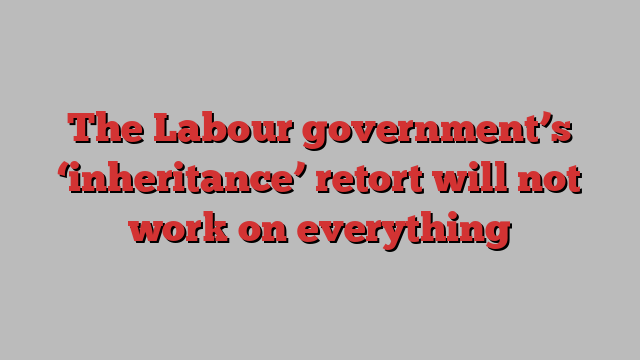
This article is an on-site version of our Inside Politics newsletter. Subscribers can sign up here to get the newsletter delivered every weekday. If you’re not a subscriber, you can still receive the newsletter free for 30 days
Good morning. Labour’s “it’s awful, it’s so so awful” tour reached the Home Office yesterday. But it’s an easier argument for them on public services than it is on immigration. Some more thoughts on that in today’s newsletter.
Inside Politics is edited by Harvey Nriapia today. Read the previous edition of the newsletter here. Please send gossip, thoughts and feedback to [email protected]
Labour the point
The Conservative government spent more than £700mn on the Rwanda scheme, Yvette Cooper told MPs yesterday, giving £290mn to the Rwandan government and with the rest spent on “chartering flights that never took off, detaining hundreds of people and then releasing them”, and employing more than 1,000 staff.
Only four people ever went to Rwanda during the last government, and all under a separate, voluntary scheme. (Well, four people plus a series of Conservative ministers.)
Part of what Cooper is doing is reinforcing Labour’s bigger message: “you’ve had some right cowboys in here, and it’s going to cost a lot and take a great deal of time to fix it”. (“Bring out your dead”, a phrase that Labour has cribbed from former Conservative cabinet minister Justine Greening, is what ministers have been instructed to do, scouring their departments for costly schemes, hidden liabilities and black holes to facilitate this.)
The Conservatives have given a big helping hand to Labour in enabling this argument. First, because the party’s stewardship of the country’s public services outside of schools was not great and its record since 2019 was particularly weak. Second, the promises Rishi Sunak made as prime minister on tax and spend were irresponsible. And third, because the Conservatives are having a long leadership election that means their annual conference will be devoted to infighting. The party will not announce its new leader until November 2, when the news will, to be blunt, struggle to be noticed amid the final days of the US presidential election.
As a result, government ministers are not going to struggle to prosecute their big argument that the public services are in a bad state, the UK’s public finances have been badly managed and that the revenue-raising measures and tight spending settlements in Rachel Reeves’s budgets are the fault of the previous Tory government.
But where they are going to struggle is on immigration in general, both regular and irregular. No government has ever been able to entirely control all movement within and without its borders; during Labour’s last period in office, the issue taking up column inches and ministerial time was lorries.
People coming to the UK via small boat is in some ways the product of successful measures to stop lorries and other, safer methods of reaching the country. But the presence of small boats, which are visible on coastlines and whose evidence can be seen on many British beaches is, I think, more electorally painful that what came before: and it is not a policy area on which Labour has a convincing answer. Immigration in general and small boats in particular could yet be as draining for Labour as it was for the Conservatives.
Now try this
This week, I mostly listened to Chappell Roan’s The Rise and Fall of a Midwest Princess while writing my column.
Top stories today
-
‘No child should grow up in poverty’ | The prime minister has raised the prospect of lifting the two-child benefit limit, in a move that would cost the taxpayer £2.5bn a year.
-
A flying start | Labour has signalled that it is “open-minded” about a Heathrow airport expansion, as long as it meets various tests, including on the climate.
-
‘Galvanise local economies’ | The government has pledged to “fire up” skills training and resist the “easy lever” of foreign workers, launching a new body to divert government funds to adult training.
Recommended newsletters for you
US Election Countdown — Money and politics in the race for the White House. Sign up here
FT Opinion — Insights and judgments from top commentators. Sign up here